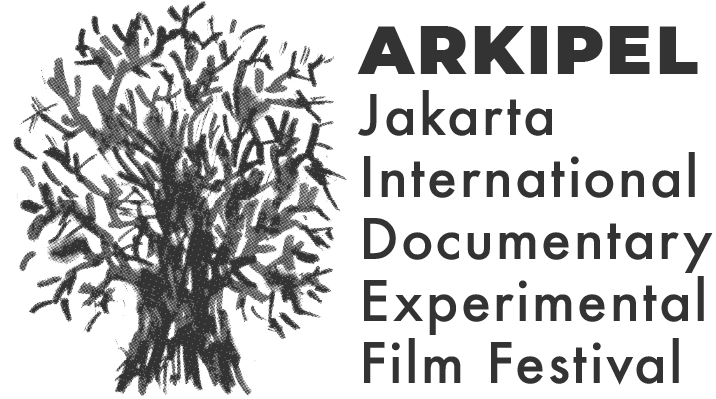Bromocorah’s Political Allegory by Technological Determinism
Alegori Politis Bromocah dari Determinisme Teknologi
Host: Manshur Zikri
Wednesday, August 21, 2019 | 13:00 | GoetheHaus
Gangguan subtil bagi sistem muncul dari keseharian orang-orang yang berada di “pinggiran”, sebagaimana direfleksikan oleh dua filem yang dikurasi di sini. Meskipun tidak selalu tuntas menggoyahkan kemapanan yang mendominasinya, model kerja, perilaku, atau tanggapan “menyimpang” kaum pinggiran (di luar sistem) melestarikan kritisisme terhadap determinan-determinan sosial dan ekonomi. Begitulah, agaknya, satu ciri keberadaan bromocorah di masyarakat.
Akan tetapi, gagasan lain yang perlu dielaborasi dalam kuratorial ini ialah determinisme teknologis yang secara proporsional terbingkai pada masing-masing filem sebagai persoalan bahasa. Dari segi yang berbeda satu sama lain, isu teknologi yang menyertai narasi masing-masing filem mengundang pertanyaan terkait penuturan filemis sutradara dalam mengungkap identitas subjek dan/atau objek yang dipengaruhi oleh hubungan antara suprastruktur dan infrastruktur. “Siklus”, kata kunci untuk mengacu benang merah yang menautkan kedua filem, adalah jembatan untuk menelusuri kausalitas penentu modus bahasa masing-masing sutradara.
Pada Big Brother Hui (2019) karya Feng Yangyang, “siklus” termaksud ialah karir kriminal Hui, dan adalah segi yang mesti disiasati oleh teknologi — kamera sutradara — saat memilah realitas paling personal yang terselip di antara peran sosial protagonis. Sementara itu, “siklus” di dalam Chinafrika. mobile (2017) karya Daniel Kötter merujuk kepada alur produksi telepon genggam lintas kawasan, dan merupakan segi yang, alih-alih sekadar diobservasi, justru mencerminkan posisi sosiokultural dari keberhinggapan sekaligus penggunaan kamera di luar kawasan dunia pertama. Meskipun memiliki plot naratif yang berbeda, baik siklus yang terjadi pada subjek di filem pertama maupun pada objek di filem kedua sama-sama menggemakan ketegangan antara entitas-entitas pembentuk sistem dan sistem itu sendiri. Gelagat penggunaan kamera dalam proses merekam—sekaligus hasil tangkapannya terhadap—sejumlah “entitas pembangkang sistem” itu pun dapat digarisbawahi sebagai alegori dari politik kebertahanan bormocorah.
Alegori itu tampak dari motif Hui merantau ke Guangdong dan upayanya mempertahankan posisi sebagai “the big brother” bawah tanah. Itu menentukan karakteristik siklus yang dijalaninya sebagai “pembangkang sistem” yang satu waktu pasti tergerus oleh zaman meskipun spiritnya tak akan hilang sama sekali. Menghindari stereotipe dan pelabelan, Yangyang menggali pandangan personal Hui untuk membangun empati terhadap siklus kebertahanan protagonis di tengah persaingan sosial-ekonomi. Sifat kamera mutakhir yang hari ini sudah kian menubuh di tangan pengguna mampu menghilangkan jarak antara perekam dan subjek yang direkam sehingga memaksimalkan fungsi kultural dokumentar observasional. Sementara itu, alegori bromocorah juga terepresentasikan dari realitas daur produksi berskala global pada model industri dunia ketiga. Siklus panjang itu merangsang beragam siasat bertahan hidup warga yang bergejolak di bawah arus utama kapital dan membangun struktur tandingan yang lebih bersifat organik. Melibatkan subjek-subjek lokal di China dan Afrika, pembingkaian Kötter atas fenomena itu secara tidak langsung memposisikan respon vernakular sebagai gaya ungkap sinematik yang, baik dari segi konseptual maupun praxis-nya, berpotensi meruntuhkan pandangan Modernisme terhadap “yang liyan” dan menuntut perspektif baru dalam memahami masa depan globalisasi ekonomi.
Dengan kata lain, dampak teknologi pada tindakan dan pikiran manusia, entah selaras atau tidak dengan sistem yang menaunginya, adalah aspek yang menjelaskan alegori politis bromocorah pada kedua filem tersebut. Adopsi teknologi modern di negara pengguna mewujud dalam dua gaya. Kalau bukan gaya yang mengamini aturan teknologis dengan niatan untuk memperbesar potensi yang selama ini luput dari tangan Modernisme itu sendiri, adopsi justru dilakukan dengan ekstrem menyimpang dari prosedur sistem, dalam rangka membuat norma tandingan yang akan mengkritisi Modernitas. Pada tingkatan tertentu, determinisme teknologis semacam inilah yang juga mendasari konstruksi sinema Big Brother Hui dan Chinafrika. mobile.
A subtle disruption to the system arises from the daily lives of people on the “periphery”, as reflected in two curated films here. Even though they do not fully agitate the dominating authorities, the “divergent model” of work, and the behaviour or response that belong to the marginalised people (outside the system) keep alive the criticism of social and economic determinants. That is perhaps the one of bromocorah‘s existential trait in the society.
However, another idea elaborated in this curatorial is technological determinism. It is proportionally framed in each film as language matter. Revealed from a different angle at each film, technological issues that accompany their respective narratives provoke questions regarding directors’ filmic articulation in revealing the identity of the films’ subject and/or object whose existence is determined by the superstructure-infrastructure relationship. “Cycle”, the keyword that links the two films, is a bridge to exploring the causal determinants of the language mode of each director.
In Feng Yangyang’s Big Brother Hui (2019), the “cycle” is Hui’s criminal career, which is a part that technology—the director’s camera—has to negotiate when it selects the protagonist’ most personal realities, which are closely interlaced with his social role. Meanwhile, the “cycle” in Daniel Kötter’s Chinafrika.mobile (2017) refers to the cross-regional production flow of mobile phone which reflect, rather than just being observed, the socio-cultural position of the presence and uses of the camera outside the First World region. Despite having different plot respectively, both the cycle experienced by the subject in the first film and the cycle happening in the object in the second film echo a tension between the system and its forming entities. The camera’s attitude in the process of recording such “dissident entities”—as well as the results of that process—can be underlined as an allegory of bromocorah’s politics of survival.
Such allegory can be traced in Hui’s motives for migrating to Guangdong and his efforts to defend his position as the “the big brother” of the underground. That things determine the characteristics of his cycle as a dissident, which will eventually erode as time passes even though its ethos will not disappear at all. Avoiding stereotypes and labelling, Yangyang explores Hui’s personal views to build empathy for the protagonist’s cycle of survival amid socio-economic competition. The quality of sophisticated cameras increasingly adhered in the hands of nowadays users is able to eliminate the distance between Yangyang, the filmmaker, and Hui, the recorded subject, so as to maximize the cultural functions of observational documentaries. Meanwhile, the allegory of bromocorah is also represented by the reality of the global-scale production in the Third World industrial model. Its long cycle of production stimulates various schemes of citizen survival that flare up under the mainstream of capital and forming a more organic counter-structures. Involving local subjects in China and Africa, Kötter’s framing of the phenomenon indirectly posits the vernacular responses in the film as a cinematic style of expression which, both in terms of conceptual and praxis, has the potential to disrupt Modernism’s view of the “other” and demand new perspectives in understanding the future of economic globalization.
In other words, the impact of technology on human actions and minds, whether being in accordance or not with the dominating system, becomes an aspect that explains bromocorah‘s political allegory in both films. The adoption of modern technology in its user countries manifests in two styles. If it is not a style that follows technological rules with the intention to enhance the potential that has so far escaped the hands of Modernism itself, the adoption is then carried out with extreme deviations of the system procedures, in order to create counter norms that will criticize Modernity. To some degree, this kind of technological determinism also underlies the construction of the Big Brother Hui and Chinafrika.mobile cinema.
Film List

Big Brother Hui
Filmmaker Feng Yangyang (China)
International Title Big Brother Hui
Country of Production China
Language Chinese
Subtitle English
79 min, stereo, digital, 16:9, color, 2019
Yangyang merekam dengan begitu intim hari-hari yang dijalani Hui, laki-laki asal Henan yang bermigrasi ke Guangdong dan menjadi “The Big Brother” di sana. Hui memimpin operasi bisnis ilegal (perjudian dan prostitusi) di sebuah daerah yang termasuk dalam cakupan proyek Miles Silver Beach (milik perusahaan Country Garden). Ia mesti bersiasat menghadapi revitalisasi industri yang semakin massif di samping konflik-konflik eksternal dan internal antargang ataupun intrakelompok yang mengancam status quo-nya sebagai penguasa bawah tanah. Narasi kehidupan Hui mewakili fenomena sosiologis “bromocorah” secara aktual, bahwa relasi kekuasaan tersistem kerap mendominasi riak residual yang bergerak di luarnya, menciptakan dinamika kebertahanan hidup dan eksistensi kemanusiaan yang menggugah.
Yangyang so intimately filmed the days of Hui, a man from Henan who migrated to Guangdong and became “The Big Brother” there. Hui leads an illegal business (gambling and prostitution) in an area covered by the Miles Silver Beach project (owned by the Country Garden company). He has to face the increasingly massive industrial revitalization, in addition to external and internal conflicts of his group threatening his status-quo as an underground’s big guy. Hui’s life narrative represents the actual “bromocorah” sociological phenomenon in which systemic power relations often dominate residual ripples that work in the margin, echoing a dynamic of survivability and evocative human existence.

Feng Yangyang adalah pembuat film Tiongkok yang lahir pada tahun 1990 dan tinggal di Beijing. Dia bekerja sebagai asisten sutradara pertama di industri film dan televisi selama 6 tahun.
Feng Yangyang is a Chinese filmmaker who was born in 1990 and lives in Beijing. He is working as the first assistant director of the film and television industry for 6 years.

Chinafrika. mobile
Filmmaker Daniel Kötter (Germany)
International Title Chinafrika. mobile
Country of Production Germany
Language French & English
Subtitle English
38 min 26 sec, stereo, HD, 16:9, color, 2017
Menelusuri siklus produksi dari sebuah jenis teknologi komunikasi, telepon genggam, dengan mencakup alur persebaran lintas kawasan di tiga negara (Republik Demokrasi Kongo, China, dan Nigeria), filem ini menggarisbawahi hubungan dan peran China dan Afrika sebagai dua kekuatan yang juga menentukan globalisasi ekonomi, politik, dan budaya. Melibatkan para penambang, buruh pabrik, pedagang, dan pengumpul di tiga wilayah tersebut, Chinafrika. mobile hadir sebagai esai kritis mengenai Modernisme, yang di dalamnya terbingkai suatu artikulasi lokal yang secara nyata bersikap di luar ciri kewajaran ala tekno-sosial, memicu pertanyaan tentang peran benua adidaya lainnya di dalam hubungan politik antarkawasan dan perspektif baru mengenai masa depan kapital.
Tracing the production cycle of one type of communication technology, handphone, by covering the lane of distribution across regions in three countries (DR Congo, China, and Nigeria), this film underscores the relationship between and the role of China and Africa as two forces that also determine economic, political and cultural globalization. Involving miners, factory workers, traders, and collectors in the three regions in its film production, Chinafrika.mobile emerges as a critical essay on Modernism, in which the local articulation behaving outside the techno-social customs was framed; triggering questions of other superpower continents’ role in the cross-regional political connection, as well as evoking new perspectives on the future of the capital.

Daniel Kötter adalah pembuat filem dan sutradara teater musik yang aktif secara internasional. Fokus karyanya berkisar antara beragam media dan konteks-konteks kelembagaan, dan menggabungkan teknik filem eksperimental strukturalis dengan elemen performatif dan dokumenter. Karya-karyanya telah dipresentasikan di berbagai festival seni, filem dan video, galeri, teater dan ruang konser internasional.
Daniel Kötter is an internationally active filmmaker and musical theatre director. His works oscillate between different media and institutional contexts and combine techniques of structuralist experimental film with performative and documentary elements. They have been screened worldwide at numerous film and video art festivals, galleries, theatres and concert halls.
About the Host

Manshur Zikri (Pekanbaru, 1991) adalah seorang penulis-peneliti independen, kritikus, dan aktivisi kultural di bidang media, seni, dan filem. Anggota Forum Lenteng, sebuah organisasi egalitarian dan non-profit yang berbasis di Jakarta, berfokus pada kerja-kerja aktivisme kultural.
Zikri adalah salah satu anggota tim selektor ARKIPEL bromocorah.
Manshur Zikri (Pekanbaru, 1991) is an independent writer-researcher, critic and cultural activist in the field of media, arts and film. A member of Forum Lenteng, an egalitarian and non-profit organization based in Jakarta which focuses on cultural activism.
Zikri is one of the selector members at ARKIPEL bromocorah.

